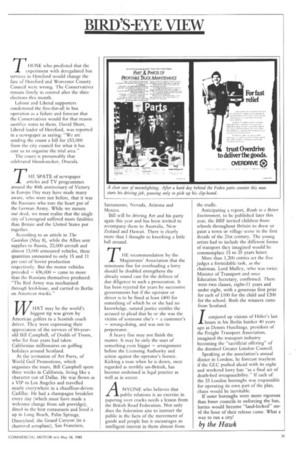BIRD'S-EYE VIEW
Page 37

If you've noticed an error in this article please click here to report it so we can fix it.
THOSE who predicted that the experiment with deregulated bus services in Hereford would change the face of Hereford and Worcester County Council were wrong. The Conservatives remain firmly in control after the shire elections this month.
Labour and Liberal supporters condemned the free-for-all in bus operation as a failure arid forecast that the Conservatives would for that reason sacrifice votes to them. David Short, Liberal leader of Hereford, was reported in a newspaper as saying; "We are sending the count a bill for £53,000 from the city council for what it has cost us to organise the trial area."
The count is presumably that celebrated blood-sucker, Dracula.
THE SPATE of newspaper articles and TV programmes around the 40th anniversary of Victory in Europe Day may have made many aware, who were not before, that it was the Russians who tore the heart put of the German Army. While we mourn our dead, we must realise that the single city of Leningrad suffered more fatalities than Britain and the United States put together.
According to an article in The Guardian (May 8), while the Allies sent supplies to Russia, 22,000 aircraft and almost 13,000 armoured vehicles, these quantities amounted to only 15 and 11 per cent of Soviet production respectively. But the motor vehicles provided — 436,000 — came to more than the Russians themselves produced. "The Red Army was mechanised through lend-lease,. and carried to Berlin on American trucks."
WHATmay be the world's WHAT
tip was given by American golfers to a Scottish coach driver. They were expressing their appreciation of the services of 60-yearold Bill Campbell, of Dodds of Troon, who for four years had taken Californian millionaires on golfing holidays around Scotland.
At the invitation of Art Parra, of World Golf Promotions, which organises the tours, Bill Campbell spent three weeks in California, living like a character out of Dallas. He was flown as a VIP to Los Angeles and travelled nearly everywhere in a chauffeur-driven Cadillac. He had a champagne breakfast every day (which must have made a welcome change from salt porridge), dined in the best restaurants and lived it up in Long Beach, Palm Springs, Disneyland, the Grand Canyon (in a chartered aeroplane), San Francisco, Sacramento, Nevada, Arizona and Mexico.
Bill will be driving Art and his party again this year and has been invited to accompany them to Australia, New Zealand and Hawaii. There is clearly more than I thought to knocking a little ball around.
THE recommendation by the Magistrates' Association that the minimum fine for overloading a lorry should be doubled strengthens the already sound case for the defence of due diligence in such a prosecution. It has been rejected for years by successive governments but if the operator or driver is to be fined at least .1:400 for something of which he or she had no knowledge, natural justice entitles the accused to plead that he or she was the victim of someone else's — a customer's — wrong-doing, and was not its perpetrator.
A heavy fine may not finish the matter. It may be only the start of something even bigger — arraignment before the Licensing Authority and action against the operator's licence. Kicking a man when he is down, once regarded as terribly un-British, has become enshrined in legal practice as well as in soccer.
ANYONE who believes that public relations is an exercise in papering over cracks needs a lesson from the British Road Federation. Not only does the federation aim to instruct the public in the facts of the movement of goods and people but it encourages an intelligent interest in them almost from
the cradle.
Anticipating a report, Roads to a Better Environment, to be published later this year, the BRF invited children from schools throughout Britain to draw or paint a town or village Scene in the first decade of the 21st century. The young artists had to include the different forms of transport they imagined would be commonplace 15 to 25 years hence More than 1,200 entries set the five judges a formidable task, as the chairman, Lord Mulley, who was twice Minister of Transport and once Education Secretary, confirmed. There were two classes, eight-11 years and under eight, with a generous first prize for each of .000 for the child and £200 for the school. Both the winners came from Scotland.
Iconjured up visions of Hitler's last hours in his Berlin bunker 40 years ago as Dennis Hutchings, president of the Freight Transport Association, imagined the transport industry becoming the "sacrificial offering" of the doomed Greater London Council.
Speaking at the association's annual dinner in London, he forecast mayhem if the GLC pushed ahead with its night and weekend lorry ban "as a final act of death-bed irresponsibility." If each of the 33 London boroughs was responsible for operating its own part of the plan, chaos would be inevitable.
If outer boroughs were more rigorous than Inner councils in enforcing the ban, lorries would become "land-locked" until the hour of their release came. What a way to run a city!
by the Hawk




















































































